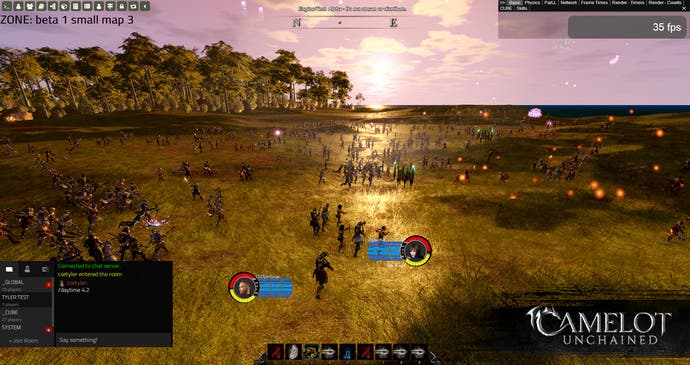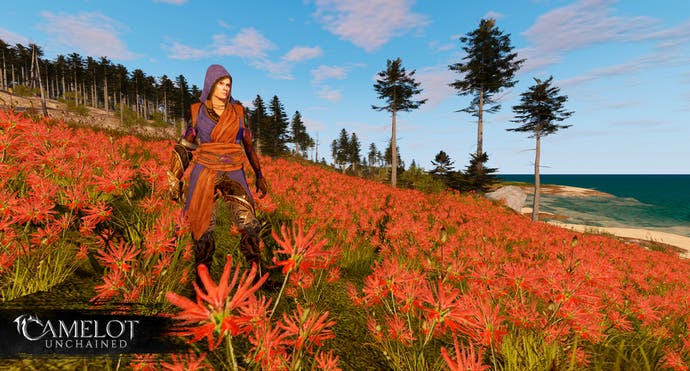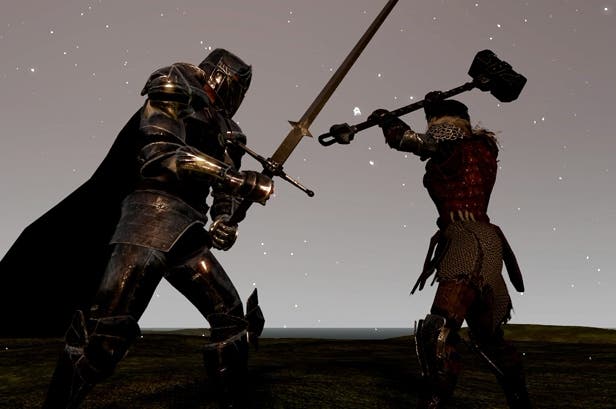Why the people behind crowdfunded Camelot Unchained won't sell spaceships or castles
"We are getting close to a tipping point…"
When Camelot Unchained ran out of crowdfunding money, Mark Jacobs did something unusual by today's standards: he put his hand in his own pocket and paid for development himself. Camelot Unchained didn't begin offering houses or castles or spaceships (let's call them horses) for real money, didn't become an intoxicating shopping mall for pledging support. Being delayed was developer City State Entertainment's fault so why should the community foot the bill?
"It hurt," Mark Jacobs told me on the phone. He had already added $2 million of his own to the game's $2.2m Kickstarter tally to get the game made, but that was back in 2013, when Jacobs was talking optimistically about a 2015 Camelot Unchained release. He didn't realise programmers would be like gold dust and near impossible to find; he didn't realise the game's ability system would fail and need rebuilding; and he couldn't predict his wife would battle with breast cancer. $4.5m only took a team of 30 people so far. Something had to be done.
"It hurt my bank account a lot because I wasn't a billionaire or super-rich by any standard," he said. "But look, I made a deal, and I told backers I would do it. It's our fault. It was on us as a development team to deliver the game; we did not. The bottom line is we did not meet what our projections were. I made a choice and it wasn't an easy one: do I honour our commitment to those same people who gave us this chance by not treating them as walking wallets, or not?
"I understand why these other games do it but that was not for me. That's not how I wanted to live my life and run this studio. There were some very strong arguments to be made that if people are willing to spend the money, you should try to get it from them. I don't buy that. I don't. I want to treat gamers the way I want to be treated. There's a better way to do things."

Jacobs' way was to - in a deal only announced yesterday - secure $7.5m to finish Camelot Unchained. "That amount... Even if we didn't get a single other penny from crowdfunded donations, we'd be fine to get this game out," he said. Incidentally, Jacobs has known the investors for decades and nothing operationally will change.
Now, the plan is to do a Camelot Unchained beta this year, with battleground brawls - Saturday night sieges as they're known - from the spring. "We are also shooting for a release in 2019 if - and it's a giant if - we can hire enough programmers," he said. "If we can, I am very confident we can deliver this game in '19. It may be late in '19 but I think we can deliver it."
As it stands, Camelot Unchained looks a long way off. What videos there are resemble technical demonstrations of lots of characters running around in one big field; there's no discernible game, with a shape and direction, on display. But what we're seeing is very important.
The core promise of Camelot Unchained was always to have hundreds - if not thousands - of people fighting in huge three-way wars, with no server crashes and slideshow game performance. The videos show Camelot Unchained partially achieving that. They show players and bots - simulated remote clients - in their hundreds, even thousands, engaging in basic combat with simple spell effects. I remember Dark Age of Camelot falling apart with 300 people fighting - Camelot Unchained once topped 3000.
"Do I think an 800-person battle is doable? Yes, no question about it. Do I think a 1000-person battle is doable? Yes, no question about it. Do I think a 2000-person battle is doable? We've had 2000 bots running around with players and, just as you see in the video [unedited footage from Dragon Con 2017], you can do it.
"No one's been able to do the same thing with either players or bots," he added. "No MMO, none. Not Dark Age of Camelot, not even The Elder Scrolls Online. We have shown our backers that we can do both."
But where is everything else? Camelot Unchained had some big and bold ideas about reinventing typical MMO mechanics. There was the idea for a stealth mechanic based around exploiting another plane (a bit like the Fade in Dragon Age); a magic system where players could combine powers to make, for instance, even bigger ice walls, and then melt the ice walls with fire to create steam, and blow the steam with wind to create a cloud of cover. There was siege gameplay based on a micro-Minecraft block building system, where towers could be brought down by targeting load-bearing sections. None of that can be seen in the videos (although the block-based building has been up and running in the separate Camelot Unchained Building Environment - CUBE - application for a while).
Even with the time-consumingly reworked ability system up and running - where you can make your own abilities from skill components - and the engine on track, it still leaves a heck of a lot of work for a 30-40 person team to do. "In terms of how much of a game there is, in terms of game-game, in terms of progression, in terms of finished areas: not a lot," Jacobs said. "We haven't even started on it." It hardly instils rock-solid confidence in a possible launch next year, does it?
Remember, though, there's a lot Camelot Unchained doesn't have to do. With no levelling, no one-to-whatever level grind, there's no need for all the quests and hubs and monsters and equipment which go with it. In this way Camelot Unchained relieves itself of a huge development timesink, allowing the team to focus on the core systems and tools players need to make content for each other instead, be it through combat or crafting or whatever.
Whether the ambitious gameplay systems will work as Jacobs imagines, I don't know, but he's not wedded to them so much as the requirement they be "fun", which I like. I also like how he's doing business, and the refreshingly simple and poignantly moral message it sends. Camelot Unchained does not have an Imperial Palace for sale for nearly £6000 like Crowfall does, staggeringly; it doesn't have a whole real-money real-estate business like Shroud of the Avatar did before it could proverbially walk; and it doesn't sell the fantasy equivalent of spaceships for hundreds of pounds like Star Citizen so controversially does.
These games still haven't launched; they are cashing in on to-be-fulfilled promises. But things are coming to a head, fulfilment is due, and if these games fail to deliver - the biggest of the crowdfundees, the torch bearers - the whole business model could disappear for games like them.

"We have a duty as a crowdfunded game to deliver on what we said we're going to deliver on, to do the best job we can, spend the money wisely, and treat our patrons and their money in the same way we would treat our own: with respect," said Jacobs. "And if that doesn't happen - and it doesn't matter if you're a small game or a big game - there's going to be a reckoning.
"If enough Kickstarter games fail then the reckoning can be very bad. It can be bad from a legal standpoint, it can be bad from a customer relations standpoint. We are getting close to a tipping point with a number of games, including ours, where if we don't start showing we can deliver the goods then there's going to be even less faith in crowdfunding and Kickstarters then there is now.
"And if any of the really big ones just totally fall on their face and not deliver - not a game that is great but just fail to deliver, and can't explain where all that money went - both and civil and criminal penalties could be involved, and I say this as an ex-lawyer.
"I don't want to see Kickstarter and crowdfunding go away because it's the single best change in the publisher-developer relationship I've seen in a long time. And when you combine that with Steam and other digital distribution services, which have destroyed the businesses of the brick-and-mortar, it couldn't be a better time for developers. It's fabulous. We just can't muck it up."
In other words, 2018 and 2019 will be crucially important years.










